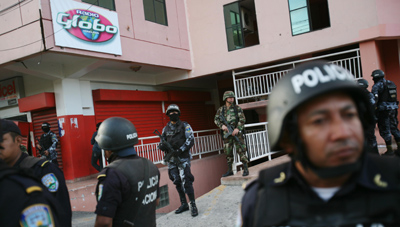News from the Committee to Protect Journalists, August 2010
Honduras report citing official failures draws a response
In a few short months, seven journalists were gunned down in Honduras. While the country has been beset by crime and political turmoil, it had not been known as a particularly dangerous place for the press. Is someone targeting the media?
CPJ dispatched consultant Mike O’Connor to Honduras to find out. His detailed report chronicling all seven murders paints a complex picture in which journalists covering crime and corruption are also tainted by it. While there is no evidence of a government conspiracy in the killings, there are plenty of indications of official indifference and incompetence in carrying out investigations. The failures, CPJ found, may be fueling additional violence.
Our report received widespread coverage, including a piece in The New York Times. A Honduran government official wrote the Times, claiming limited progress in the investigations. Responding on the CPJ Blog, CPJ Senior Americas Program Coordinator Carlos Lauría says the government has yet to grasp the extent of the problem.
Report on Thai attacks sparks a government meeting
Four months after the Thai government declared a state of emergency and government troops took the streets of Bangkok back from armed political protesters, the killings of two journalists and the wounding of several others have not been investigated, according to a CPJ report released on July 29. The report was written by CPJ Senior Southeast Asia Representative Shawn W. Crispin, who lives and works in Bangkok and covered many of the protests himself.
While it was not possible to pinpoint responsibility for the killings, Crispin found that government investigators had ignored crucial evidence and refused to share their findings with qualified investigators working on behalf of the victims. In an emotional press conference in Bangkok alongside the sister of slain Italian journalist Fabio Polenghi, Crispin called for greater transparency and openness in the investigative process.
On August 4, Asia Program Coordinator Bob Dietz and Washington Representative Frank Smyth followed up with a meeting at the Thai Embassy in Washington to reiterate our concerns.
Safety first online
We know that some readers of CPJ’s website around the world are at risk for surveillance and censorship. With that in mind, we have introduced an alternative Web address that is secure and encrypted.
If you go to https://cpj-preprod.go-vip.net/ (instead of the usual http://cpj-preprod.go-vip.net/) your browsing on our site will be secure. Writing about the switch, CPJ Internet Advocacy Coordinator Danny O’Brien noted on the CPJ Blog, “Switching to https is not without its challenges (our Web developer John Emerson led us through the process), but the rewards are worth it. It’s time for more companies to turn on https for all their traffic: and it’s time for technologists to make it easier for them to do so. Doing so will make the Internet safer for at-risk journalists and a free press, but it’ll also make it more secure and private for us all.”
You can find O’Brien’s blog (and more information) here: http://cpj-preprod.go-vip.net/blog/2010/07/using-https-to-secure-the-web-for-journalism.php
And, on the secure site, here: https://cpj-preprod.go-vip.net/blog/2010/07/using-https-to-secure-the-web-for-journalism.php
CPJ on a mission
There’s been no summer letup at CPJ and the fall looks even busier. Here’s a rundown of recent missions and coming reports.
Middle East Program Coordinator Mohamed Abdel Dayem is back from Yemen, where he found the media situation dire. “Journalists have long endured government intimidation and even violent attacks,” he says. “But today, new laws and amendments currently pending in parliament could essentially legalize government repression.” His report is due out in early fall.
Asia Research Associate Madeline Earp traveled to Hong Kong, Guangzhou, and Beijing to report on how journalists are increasingly willing to speak up when colleagues are physically attacked. Her report will be released soon.
Kazakhstan is currently serving as the chairman of the Organization for Security and Co-operation in Europe–despite having one of the region’s worst press freedom records. The Vienna-based governmental organization has a mandate to promote human rights and democracy, and Kazakhstan’s record is tarnishing the OSCE. Europe and Central Program Coordinator Nina Ognianova, who traveled to Kazakhstan this summer, looks at the contradiction in a report to be released in September.
Asia Program Coordinator Bob Dietz, Journalists Assistance Coordinator Maria Salazar-Ferro, Southeast Asia Consultant Shawn Crispin, and board member Sheila Coronel are in the Philippines right now, where they are pushing for justice in the Maguindanao massacre, the worst single killing of journalists ever. They are meeting with the families of the victims and government officials.
CPJ will release “Silence or Death in Mexico’s Press” on September 8. The report chronicles the impact the drug cartels are having on the country’s media. We will be holding a roundtable with top editors in Mexico City to discuss our findings.
And a CPJ delegation led by board member Kati Marton and CPJ Chairman Paul Steiger will be returning to Moscow in late September to follow up on our 2009 impunity mission. We were invited back by Russian prosecutors who promised to update us on their progress in investigating now 19 outstanding murder cases.
The best of the blog
